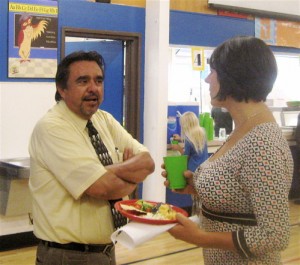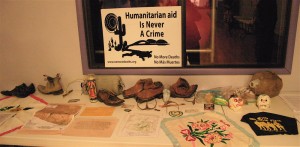
Joe Gutierrez, principal of Killip Elementary School in Flagstaff, speaks with teacher Ginni Biggs. Photo courtesy of Flagstaff Unified School District
Killip Elementary School and its principal, Joe Gutierrez, received the NAU Social and Behavioral Sciences Community Partners organization and individual awards from Miguel Vasquez of the NAU Anthropology Dept., and Luis Fernandez, director of the NAU Sustainable Communities Program, for the school’s innovative work in welcoming NAU graduates and undergraduates to work with Killip students.
“The most underused resources in this community are NAU students,” Gutierrez said. He has changed that by bringing in NAU students to work with Public Achievement, the FACTS Program, FoodLink and many other community organizations at Killip, as well as to provide student research opportunities in evaluation of various aspects of the Killip experience.
“He is a true community partner,” Vazquez said.
Killip Elementary School y su principal, Joe Gutierrez, recibieron premios como Socios Comunitarios del Colegio de Ciencias Sociales y Comportamiento de Miguel Vasquez del NAU Depto. de Anthropologia y Luis Fernandez, director del programa de Comunidades Sostenibles de NAU, por el trabajo inovativo de la escuela en recibir estudiantes de NAU para colaboración con los estudiantes de Killip.
“Los recursos menos utilizados en esta comunidad son los estudiantes de NAU”, dijo Gutierrez. Él ha cambiado esto, trayendo estudiantes de NAU a trabajar con Public Achievement, el Programa de FACTS, FoodLink y muchos otros organizaciones comunitarios en Killip, tanto para proporcionar oportunidades a los universitarias para la investigación evaluando varios aspectos de la experiencia en Killip.
“Él es un verdadero socio comunitario”, dijo Vasquez.
Nearly $1,000 was raised during the 6th annual “Dancing Across Borders” fundraiser to benefit the Tucson-based humanitarian group No More Deaths / No Más Muertes, said Katrin “Kati” Pantsosnik, a member of the group’s Flagstaff chapter. Pantsosnik is also an organizer with the Northern Arizona University Latin Dance Club, which provided dance lessons for the fundraiser, held April 27 at Transzend Studio in Flagstaff.
No More Deaths provides water and medical aid to immigrants crossing the U.S. / Mexican border in southern Arizona and humanitarian aid to those who have been deported to Mexico. The fundraiser also included a silent auction and displays of shoes, hats and other items left by immigrants crossing the Sonoran desert. Pantsosnik has participated in every fundraising dance since its inception.
“It was my friend’s idea when I first moved to Flagstaff,” said Pantsosnik, who emigrated from Estonia. “The first year we raised $700. She then graduated (from NAU) and left and so I just held onto it.” Because of her immigrant background, Pantsosnik says she understand the challenges facing those seeking to become U.S. citizens and the need for meaningful immigration reform in order to end often deadly border crossings. The group reports that nearly 180 human remains have been found in the past year.
“In previous years people haven’t been involved with the issue. But with immigration reform in the news, people are more involved, but they need to take that extra step to understand why people are dying in the desert, why are they leaving their homes,” including trade agreements that have eliminated jobs in Mexico, she said. “I just think there needs to be more education and awareness. Every time I meet people I try to explain the issues, but some people have just made up their minds and only want to hear people they agree with.”
The heated immigration reform debate may have hurt this year’s event. Donations to the fundraising dance were down this year from $1,500 in 2012, while acts of vandalism were up, she said. “This year I had more challenging responses from people and saw more of our posters taken down,” she said. “There seemed to be more people against it this year than in previous years.” However, Pantsosnik said she is determined to carry on the fundraising program and urges people to donate to No More Deaths in Tucson by going to the group’s website: http://www.nomoredeaths.org.

Zapatos, ropa, y otras cosas perteniciente a los inmigrantes que cruzaron el Desierto Sonorense se exhibieron durante el evento anual para recaudar fondos “Bailando atrevez del las Fronteras”. Foto por Frank X. Moraga / AmigosNAZ
Casi se recaudó $1,000 durante el sexto evento anual “Bailando Atravez de Fronteras” para beneficiar el grupo humanitario de Tucson No More Deaths / No Más Muertes, dijo Katrin “Kati” Pantsosnik, una miembra del grupo de Flagstaff. Pantsosnik tambien es una organizadora con el Club de Baile Latino de Northern Arizona University, lo cual dio lecciones de baile para el evento, el 27 de abril, en Transzend Studio en Flagstaff.
No More Deaths proorciona agua y ayuda médica a los inmigrantes cruzando la frontera de E.U./ Mexico en el sur de Arizona y ayuda humanitaria a los que han sido deportado a Mexico. El evento tambien incluyó un subasta silenciosa y una exhibición de zapatos, sombreros, y otras cosas dejadas por los inmigrantes cruzando el Desierto Sonorense. Pantsosnik ha participado en cada baile para fondos desde que empezaron.
“Era el idea de mi amigo cuando primero vine a Flagstaff”, dijo Pantsosnik, que emigró de Estonia. “El primer año recaudamos $700. Luego graduó ella de NAU y se fue y asi que yo lo continuaba”. Por su historia inmigrante, Pantsosnik dice que intiende los retos que enfrentan los que buscan ponerse ciudadanos de los E.U. y la necesidad de una reforma migratoria significativa para acabar con los muertos fronterizos. El grupo reporta que restos de casi 180 humanos se han encontrado en el año pasado.
“En años previos la gente no se involucraron con el asunto. Pero con la reforma migratoria en las noticias, se han metido mas, pero necesitan tomar el próximo paso para comprender porque se mueren la gente en el desierto, porque se van de sus hogares”, incluyendo los acuerdos de comercio que han eliminado trabajos en Mexico, dijo. “Pienso que hay que ver mas educación y conciencia. Siempre trato de explicar los asuntos, pero algunos ya estan decididos y solo quieren escuchar a los con que se acuerden”.
El debate caliente de la reforma migratoria talvez dañó al evento este año. Las donaciones al baile este año bajaron de $1,500 en 2012, cuando habia mas actos de vandalismo, dijo ella. “Este año me desafiaron mas y se ve que quitaron mas de nuestros posteres”, dijo. “Parece que habia mas gente en contra este año que en otros años”. Sin embargo, Pantsosnik dijo que esta determinada de seguir con el programa de recaudar fondos y le urge a la gente que donan a No More Deaths en Tucson, yendo al website del grupo: http://www.nomoredeaths.org
While medical advances continue, the fight against cancer remains a stubborn one with equal parts success and failure.
To help understand the genetic, environmental and lifestyle factors that cause or prevent cancer, the American Cancer Society has launched a series of studies nationwide.
The latest is Cancer Prevention Study 3.
While the study is open to everyone between the age of 30 and 65, the organization reported that researchers are seeking to add more Latinos to the research program.
As one of the fastest-growing demographics in the nation, the disease will continue to impact the lives of Latinos.
Those wishing to participate in the study will first be invited to take part in an enrollment event from 9 a.m. to 12:30 p.m. on June 26 and 28 at Coconino High School and from 4 to 7:30 p.m. June 27 and 29 at Killip Elementary School.
Participants will be asked to read and sign an informed consent form, complete a brief written survey, have their waist measured and provide a small blood sample which will be frozen and stored for future research.
They will then be asked to go home and take a longer mail-in or online survey where they will be asked information on their lifestyle, behavioral and other factors related to their health.
They will then periodically receive a survey at home to update the information.
If cancer affects any of the participants, the blood sample will be unfrozen for study.
Officials hope that by examining the samples, and looking at the participants’ genetic, environmental and lifestyle factors, researchers will eventually be able to trace the cause of certain cancers and design specific drugs and treatments.
To enroll, go to http://cps3flagstaff.org. Call 1-888-604-5888 for more information.
Mientras continuan los avances medicos, la lucha contra el cancer se queda muy dificil con éxitos pero tambien fracasos.
Para ayudar entender los factores genéticos, ambientales, y cotidianos que causan or previenen el cancer, la Sociedad Americana para el Cancer ha lanzada una serie de estudios nacionales. El mas reciente es el Estudio de Prevención de
Cancer no. 3.
Aunque el esta abierto a todo el mundo entre la edad de 30 y 65, la organización reportó que los investigadores buscan añadir mas gente Latina al programa de investigación.
Como uno de los grupos demográficos de crecimiento mas rápido en la nación, la enfermedad continuará impactando las vidas de los Latinos.
Los que desean participar en el estudio primero se les invitan a tomar parte en un evento de inscripción desde las 9 a.m. a 12:30 p.m. el 26 y 28 de junio en Coconino High School y de 4 a 7:30 p.m. el 27 y 29 de junio en Killip Elementary School.
Los participantes se les pedirán leer y firmar un formulario de participación informada, completar una breve encuesta escrita, tener medido su muñeca y proporcionar una pequeña muestra de sangre que se va a congelar y guarder para investigaciones en el future.
Luego se les pide regresar a la casa a completar una encuesta mas larga por correo o por internet donde se les pide información sobre su modo de vida y otros factores de comportamiento relacionado con su salud. Ellos recibiran periodicamente una encuesta en la casa para actualizar la información.
Si el cancer afecta cualquier de los participantes, la muestra de sangre se descongelará para estudiarlo. Los oficiales esperan que la examinación de las muestras y los factores genéticos, ambientales y cotidianos de los participantes, los investigadores podrían eventualmente encontrar la causa de ciertos canceres y diseñar drogas y tratamientos especificos.
Para inscribirse, vaya a http://cps3flagstaff.org
Llame 1-888-604-5888 para más información.
